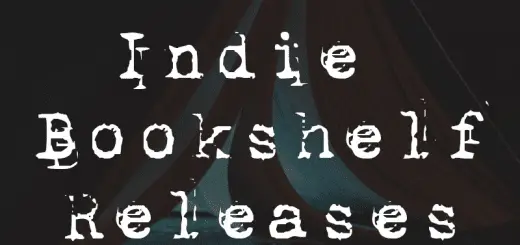Bruce McAllister & his new anthology “Stealing God”
Bruce McAllister & his new anthology “Stealing God”
By Angelique Fawns
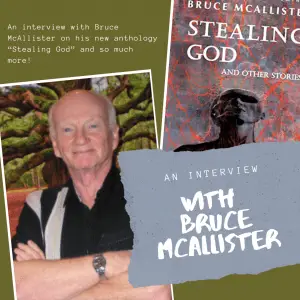 It’s rare I “hero-worship” another writer, but it when it comes to Bruce McAllister, I am definitely star-struck. McAllister is a Hugo and Nebula nominated science fiction and fantasy writer. My first taste of his genius was the imaginative telling of an alien assassin “Kin” on actor Levar Burton’s podcast Levar Burton Reads.
It’s rare I “hero-worship” another writer, but it when it comes to Bruce McAllister, I am definitely star-struck. McAllister is a Hugo and Nebula nominated science fiction and fantasy writer. My first taste of his genius was the imaginative telling of an alien assassin “Kin” on actor Levar Burton’s podcast Levar Burton Reads.
Issac Asimov himself says, “Bruce McAllister is one of the greatest talents working in the science fiction field today.”
He was the guest speaker at my January 9th, 2022 DreamCasters’ writing meeting and he shared the secrets of good writing with us. In my opinion, every word that dropped from his mouth was a nugget of pure gold.
McAllister has recently released a short story collection, Stealing God and Other Stories. Each tale is touched with magic, love, and drew me in completely.
He kindly agreed to chat with me about his anthology, writing process, and career. He even drops a few priceless pieces of advice for authors.
AF: Thanks for taking the time to talk to me today. Tell us what inspired your latest collection of short stories?
BM: Though I’ve published three novels in my career, it’s the short story that’s always held my heart—from the Golden Age of Science Fiction short stories I read when I first started reading SF (and writing SF) through the experimental New Wave of SF’s 60’s and 70’s to the present. The form just won’t let go of me; it’s a Siren that, rather than dashing me on rocks in the sea, has always made me happy, made me feel guided by a muse of some mystic kind, and always rewarded me in my life. The loyalty has been worth it.
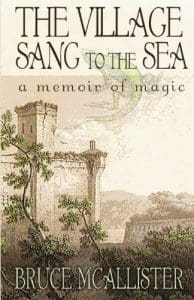 A novel (as I learned from writing DREAM BABY) can be sprawling and epic and cover a lot of time and have many character points-of-view, and is a glorious thing because of these virtues, but the short story can achieve a kind of craft perfection—or at least the possibility of it—for an author when a novel has, as one writer friend put it, and as Faulkner, for one, would agree, “too many words ever to be perfect.” This isn’t to say that the short story will ever replace the novel; it won’t and it shouldn’t, because novels take us away to magical places and keep us there when short stories just can’t—at least in the same rich embracing way. The short story is an American invention, they say, so I suppose I’m very American. My writing has always been mainly short stories, so collecting them—in the case of STEALING GOD AND OTHER STORIES collecting what people feel are my best “new millennium” science fiction, fantasy and horror short stories since my first collection—was natural; and I’m grateful to John Kenny at Aeon Press in Dublin, who also published by last novel, THE VILLAGE SANG TO THE SEA (which was a novel of linked stories—you can see the theme here), for making it happen.
A novel (as I learned from writing DREAM BABY) can be sprawling and epic and cover a lot of time and have many character points-of-view, and is a glorious thing because of these virtues, but the short story can achieve a kind of craft perfection—or at least the possibility of it—for an author when a novel has, as one writer friend put it, and as Faulkner, for one, would agree, “too many words ever to be perfect.” This isn’t to say that the short story will ever replace the novel; it won’t and it shouldn’t, because novels take us away to magical places and keep us there when short stories just can’t—at least in the same rich embracing way. The short story is an American invention, they say, so I suppose I’m very American. My writing has always been mainly short stories, so collecting them—in the case of STEALING GOD AND OTHER STORIES collecting what people feel are my best “new millennium” science fiction, fantasy and horror short stories since my first collection—was natural; and I’m grateful to John Kenny at Aeon Press in Dublin, who also published by last novel, THE VILLAGE SANG TO THE SEA (which was a novel of linked stories—you can see the theme here), for making it happen.
AF: How long did it take for you to create the collection, and what was your writing process?
BM: As I said, all the stories in the collection are from the new millennium. They were written as I always write: a short story idea (and main character and “voice”) inspires me to write it; and by that I mean the emotion is pretty intense. I don’t “think” my way through the fiction I write—which people tell me puts me in a Bradbury camp rather than an Asimov camp by “method” and in turn brain-and-heart wiring. I write it and send it out and still, after nearly sixty years of publishing SF and fantasy, have no idea which editor it will click with. Some of my best stories (i.e., those destined to make a splash with people) have appeared in smaller venues, I should add—which means that it’s important, as some writers can be, not to be a snob: A good story needs a home, and once it finds one, all sorts of good things can happen. I’m not saying a venue with terrible writing is the place to go; just not to think that the profile height of the publication is more important than the quality of the story. I’ve had stories in tiny venues people have barely heard of end up reprinted and reprinted again. (Are you hearing advice for new writers here? Of course. I never can resist.)
The story is published (sometimes it takes twenty submissions to find a home for it; sometimes it finds one right out of the gate; but, again, predicting where and who and when is, even after over half a century of doing this, impossible) and when people start telling me it’s time for a new collection, I take a look—and ask them to help me with that look—at the possible stories. In the case of this collection, since I suspect you’re wondering, I had three times as many stories as the number that appeared in it eventually; but many of those that didn’t were short, since in the new millennium I’ve had a lot of fun trying to see how much of a story can be delivered in very few words, i.e., in flash fiction. A good editor like John Kenny at Aeon is also invaluable in helping an author get distance from his own stories, see more objectively why a favorite story may just be an infatuation and not based on much more, and order them sagely and aesthetically for the book.
AF: Is there a story within STEALING GOD that is your personal favorite? Why?
BM: Love this question because I flinched reading it, and I flinched because it felt in that instant impossible to answer…and indeed, after more reflection, it is impossible. Let me hedge (of course): Four stories I like particularly from the collection are: (1) The title story, a horror piece, “Stealing God.” Why? Because it’s so autobiographical—autobiographical beyond what any reader could possible imagine—and because its central event, the theft imposed on me, I still carry with me, haunted by it. (2) “Blue Fire.” Why? Because I love Bonifacio. Who wouldn’t? I’m not a Catholic, and yet two of the stories in the collection seem to be “Catholic” (capital “C”). They’re not really. That’s simply a Judeo-Christian-iconographic away to reach for the mystical, which I do often in my fiction (including ”Kingdom Come,” which appeared in OMNI under Ellen Datlow’s directorship back in the day). They’re about something else entirely. (3) “Courtship of the Queen.” Why? Because I lived a childhood like this—yes, all those seashells and battle and “first love”—and because it’s a gentle, loving story when so much of what we read is darkness, though of course “the light shines brightest against the darkness” even in a story like this. (4) “My Father’s Crab.” Again, an autobiographical story and one driven by love—love of more than one kind.
AF: What sort of marketing have you done for it, and what has worked best?
BM: I haven’t done any marketing for it, and I need to. Short-story collections—especially ones by authors who aren’t regular producers of novels—are difficult to get out into the world. Most readers prefer novels, as we know. At the moment the “marketing” lies in word-of-mouth. One writer-friend tells me I should put together a press release saying something like “Noted SF Writer Celebrates Half a century of Publishing with New Collection,” but I’m still trying to locate what marketing bones I have in me that would allow that. I am going to do a Goodreads giveaway in two weeks, and other small online push; and I hope there may be some reviews in the major SFF&H magazines eventually, but one never knows. Reviewers are flooded with books.
AF: I noticed some of the most esteemed names in genre fiction have given you endorsements. What is your secret?
BM: I’m lucky to know these people, and I’ve gotten to know them over the years as the editors I’ve submitted stories to. That they’re willing to endorse is beyond the call of duty.
AF: What book or project are you currently working on?
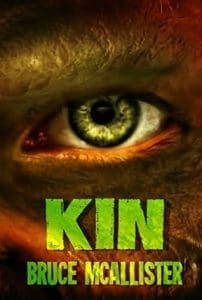 BM: A novelization—with a former university student and now screenwriter who is also an excellent fiction writer—of my Hugo-nominated story, “Kin,” the story LeVar Burton chose to launch his new podcast a few years ago. And a novel that compiles the “Emilio” stories that have appeared in F&SF and BENEATH CEASELESS SKIES—stories about a boy named Emilio set in a dreamy Italian Renaissance where the Drinkers of Blood have taken over Rome. (Yes, the same world as “Blue Fire”; Bonifacio and the horse-racing Sienese girl Catarina are friends of Emilio and travel with him in an adventure-fraught journey to defeat the Drinkers.) And an endless list of short stories, of course.
BM: A novelization—with a former university student and now screenwriter who is also an excellent fiction writer—of my Hugo-nominated story, “Kin,” the story LeVar Burton chose to launch his new podcast a few years ago. And a novel that compiles the “Emilio” stories that have appeared in F&SF and BENEATH CEASELESS SKIES—stories about a boy named Emilio set in a dreamy Italian Renaissance where the Drinkers of Blood have taken over Rome. (Yes, the same world as “Blue Fire”; Bonifacio and the horse-racing Sienese girl Catarina are friends of Emilio and travel with him in an adventure-fraught journey to defeat the Drinkers.) And an endless list of short stories, of course.
AF: You are a man who wears many hats. Author, Editor, Mentor, Coach… How do you structure your days and find time for writing yourself?
BM: I do my coaching and consulting in the morning for some hours, then writing-relating things, then actually write whenever the Androgynous Muse slaps me during the day, if that makes sense. The Muse can be harsh (but is always fair). Do I write every day? No—the doctor does not take his own advice. I hope to get back to that soon. “Writing is what we do when Life does not intrude…but we must not use the chatter of Life as excuse…..)
AF: What does Bruce McAllister do for fun when he isn’t working in the creative world?
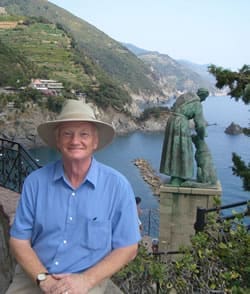 BM: Another question that, if it doesn’t make me flinch, certainly makes me squirm. My passions have always been my fun, I’m afraid; and while this is true of many “artistic”-chemistry people, I have a particular bad case of it. But when I do break away from the Word, I like to walk a nearby canyon looking for fossils not et discovered (or should I say recorded) and doing art projects of one kind or another. When you’ve lived a decently long life you discover what’s true to you and what’s not, I guess. And of course I liked adventures of any kind—taken with my adventurous wife Amelie, former choreographer and medical Qi Gong teacher, my kids and their kids. And by “adventure” I don’t mean the usual tourist trip. If I don’t come back from a trip with a scientific discovery or a major, revealing, epiphanic encounter (of the good kind) with people from another world I’m not happy, so I plan and behave accordingly.
BM: Another question that, if it doesn’t make me flinch, certainly makes me squirm. My passions have always been my fun, I’m afraid; and while this is true of many “artistic”-chemistry people, I have a particular bad case of it. But when I do break away from the Word, I like to walk a nearby canyon looking for fossils not et discovered (or should I say recorded) and doing art projects of one kind or another. When you’ve lived a decently long life you discover what’s true to you and what’s not, I guess. And of course I liked adventures of any kind—taken with my adventurous wife Amelie, former choreographer and medical Qi Gong teacher, my kids and their kids. And by “adventure” I don’t mean the usual tourist trip. If I don’t come back from a trip with a scientific discovery or a major, revealing, epiphanic encounter (of the good kind) with people from another world I’m not happy, so I plan and behave accordingly.
AF: If you could give one piece of salient advice to writers struggling for success, what would it be?
BM: Ah…. Any committed writer will make it very simple if you ask: “Write every day and read, read, read.” Why does the writer put it so succinctly, often not offering anything but these few words. Because if you do these things you will grow and actually BE a writer. If you don’t, you won’t. I’d definitely add—because I’m a coach/consultant for new writers and established ones hitting blocks of one kind or another: You must read what you wish to write and read it voraciously–eat it, breathe it, become it (re-read favorite works, coy favorite sections form the, do the Hemingway exercise and the “double outline” exercise with them—out of love and wanting to learn their magic)—what you would have done when you were little and loved the color purple or dinosaurs…but what adults forget to do later in life because…well, because they’ve forgotten how they came to know the world profoundly.
Thanks for the good questions, Angelique. Some wonderful surprises here—something I always appreciate!
- About the Author
- Latest Posts
Angelique Fawns writes horror, fantasy, kids short stories, and freelance journalism. Her day job is producing promos and after hours she takes care of her farm full of goats, horses, chickens, and her family. She has no idea how she finds time to write. She currently has stories in Ellery Queen, DreamForge Anvil, and Third Flatiron’s Gotta Wear Eclipse Glasses. You can follow her work and get writing tips and submission hints at http://fawns.ca/.

